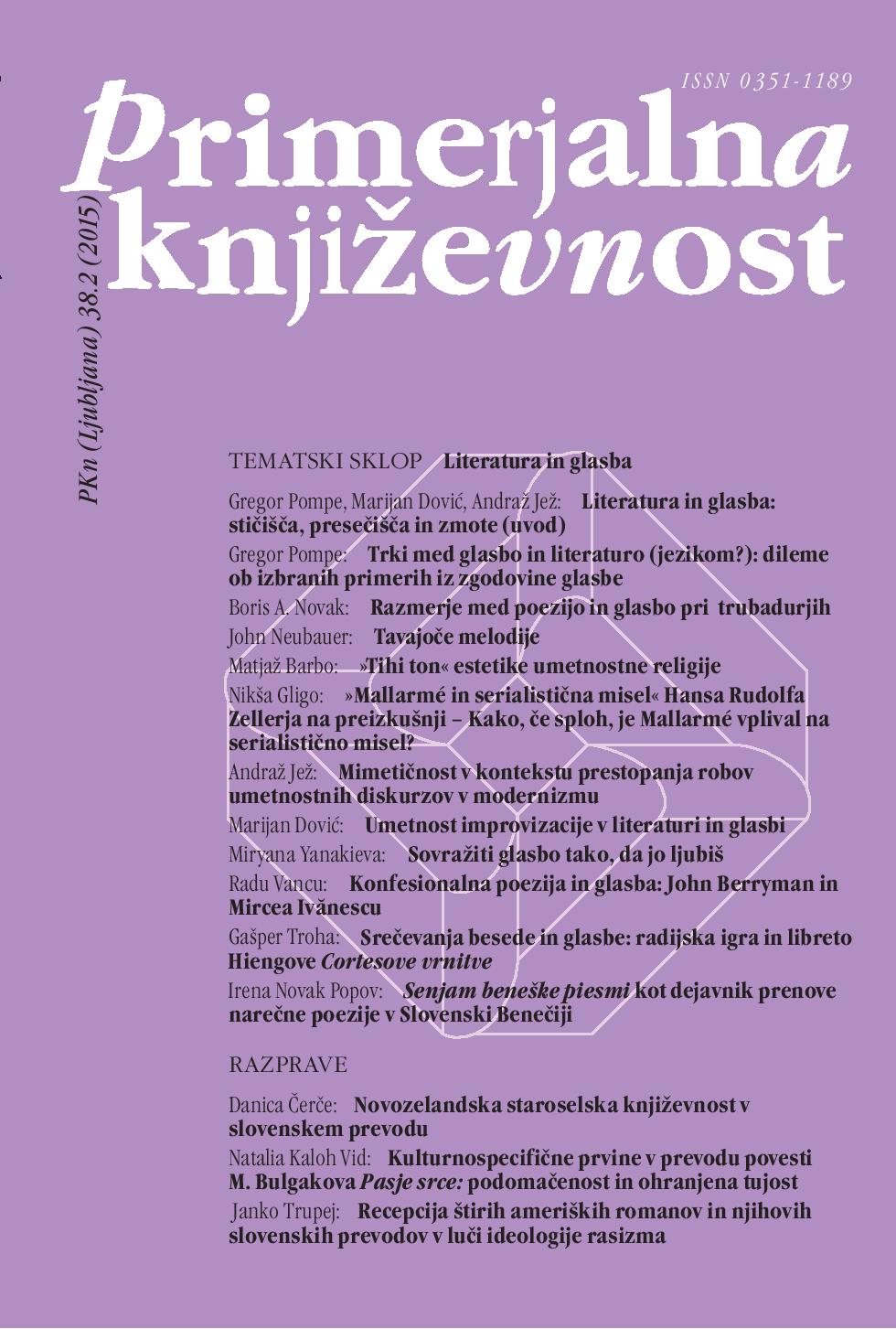Collisions Between Music and Literature (Language?): Dilemmas of the Selected Examples from the History of Music
Keywords:
literature and music, semantics of music, musicalization of poetry, Gesamtkunstwerk, musical analysis, literary interpretationAbstract
The selected examples from the history of Western music serve as starting points for a discussion of the specific, often problematic relationship between music and literature. We could describe such relationships as “collisions”, which can be understood as coincidental “meetings” that are largely inharmonious in nature and characterized by a kind of indifferent ephemerality. Literature and music stand – even when combined together in a single work of art – further apart than one would like to admit. – This article deals with the antique concept of mousikē, in which the art forms of poetry, music, dance and theatre which today are distinctly separated and unconnected, were still inextricably linked. Over time literature and music became increasingly autonomous, as can be seen in the politextuality of the early motets, the polyphonic madrigals of the 16th century, the Baroque theory of rhetoric, and the theory of affects, topic theory as applied to the music of the classical period, the 19th century dichotomy inherent in Hegel’s thoughts on the shortcomings of absolute instrumental music, and Schopenhauer’s placing of music above the other arts. Additional questions are posed in connection with operatic reforms (in the light of efforts to restore the antique form of mousikē) as well as Liszt’s concept of the symphonic poem. Some instances and examples also give rise to analysis of speech-derived compositions from the second half of the 20th century. Ultimately, the thesis reflects on the idea that parallels between music and literature should not be sought on the level of two distinct art forms, but rather on the substrata-level of both art forms – between music and language – as it would seem that music often behaves like a distinctly syntactical part of language.References
Glasba in poezija. Slovenski glasbeni dnevi 1990. Ur. Primož Kuret in Julijan Strajnar. Ljubljana: Festival, 1990.
Agawu, Kofi Victor. Playing with Signs. A Semiotic Interpretation of Classic Music. Princeton: Princeton University Press,1991.
Barthes, Roland. Image Music Text. London: Fontana Press, 1977.
Bedina, Katarina. »Slovenska percepcija Richarda Wagnerja«. Zbornik ob jubileju Jožeta Sivca. Ur. Jurij Snoj in Darja Frelih. Ljubljana: Slovensko muzikološko društvo, Založba ZRC SAZU, 2000. 193–204.
Bent, Margaret. »Polyphony of Texts and Music in the Fourteenth-Century Motet: Tribum que non abhorruit/Quoniam secta latronum/Merito hec patimur and Its Quotations«. Hearing the Motet: Essays on the Motet of the Middle Ages and Renaissance. Ur. Dolores Pesce. Oxford: Oxford University press, 1997. 82–103.
Brown, Calvin S. Music and Literature. A Comparison of Arts. Atene: The University of Georgia Press, 1948.
George J. Buelow. »Affects, Theory of the«. Grove Music Online. Oxford Music Online. Oxford: Oxford University Press, dostopano 19. junij 2014. http://www.oxfordmusiconline.com/subscriber/article/grove/music/00253.
Cooke, Deryck. The Language of Music. Oxford: Oxford University Press, 1959.
Dahlhaus, Carl. Die Idee der absoluten Musik. Kassel: Bärenreiter, 1978.
– – –. Estetika glasbe. Ljubljana: Cankarjeva založba, 1986.
Danuser, Hermann. Die Musik des 20. Jahrhunderts. Laaber: Laaber-Verlag, 1984.
Grey, Thomas S. Wagner’s Musical Prose. Texts and Contexts. Cambridge: Cambridge University Press, 1995.
Hampton, Morris D. A Descriptive Study of the Periodical Revue wagnérienne Concerning Richard Wagner. Lewiston: Edwin Mellen Press, 2002.
Hegel, Georg Wilhelm Friedrich. Vorlesungen über die Ästhetik. Dostopano 20. junij 2014. http://www.textlog.de/5779.html.
Karbusicky, Vladimir. Grundriß der musikalischen Semantik. Darmstadt: Wissenschaftliche Buchgesellschaft, 1986.
– – –. » Einleitung: Sinn und Bedeutung in der Musik«. Sinn und Bedeutung in der Musik. Ur. Vladimir Karbusicky. Darmstadt: Wissenschaftliche Buchgesellschaft, 1990. 1–36.
Koblyakov, Lev. Pierre Boulez. A World of Harmony. Chur: Harwood Academic Publishers, 1990.
Kristeva, Julia. Revolution in Poetic Language. New York: Columbia University Press, 1984.
Leach, Elizabeth Eva. »Music and Verbal Meaning: Machaut’s Polytextual Songs«. Speculum: A Journal of Medieval Studies 85.3 (2010): 567–591.
Monelle, Raymond. Linguistics and Semiotics in Music. Edinburg: Harwood Academic Publishers, 1992.
– – –. The Sense of Music. Princeton in Oxford: Oxford University Press, 2000.
– – –. The Musical Topic. Bloomington in Indianapolis: Indiana University Press, 2006.
Murray, Penelope in Wilson, Peter. Music and the Muses: The Culture of Mousike in the Classical Athenian City. Oxford: Oxford University Press, 2010.
Neubauer, John. The Emancipation of Music from Language: Departure from Mimesis in Eighteenth-Century Aesthetics. New Haven: Yale University Press, 1986.
Ratner, Leonard G. Classic Music. Expression, Form, and Style. New York: Schirmer Books, 1980.
Taruskin, Richard. Oxford History of Western Music. Oxford: Oxford University Press, 2010, elektronska knjiga.
Wagner, Richard. Das Kunstwerk der Zukunft. Leipzig: Wigand, 1850.
– – –. Opera in drama. Nova Gorica: Založba Univerze v Novi Gorici, 2013
Walter, Michael. Richard Strauss und seine Zeit. Laaber: Laaber Verlag, 2000.
Wilson, Blake et al. »Rhetoric and Music«. Grove Music Online. Oxford Music Online. Oxford: Oxford University Press, dostopano 19. junij 2014. http://www.oxfordmusiconline.com/subscriber/article/grove/music/43166.
Žužek, Martin. Razpad mousike – vzroki in posledice glasbenega pojava, analizirani v kontekstu družbenih sprememb antične polis na prehodu iz V. v IV. stoletje pr. n. št. Magistrska naloga. Ljubljana, 2002.


